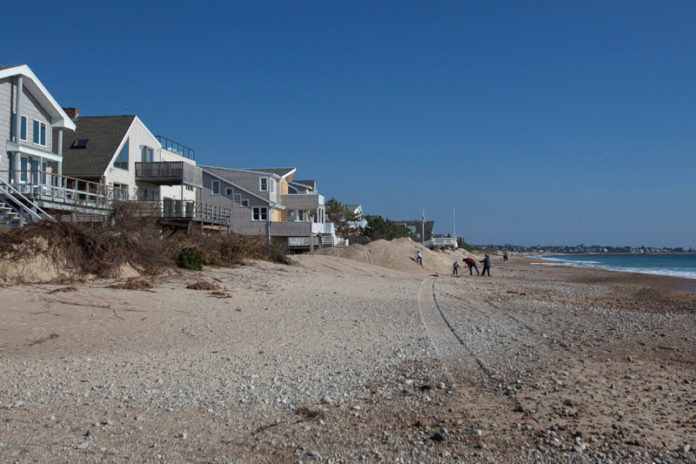
Before their properties faced the rising floodwaters of Hurricane Sandy, homeowners on Misquamicut Beach in Westerly were bracing for a legal siege from the state of Rhode Island.
Challenging their longstanding private ownership of the beach, Attorney General Peter F. Kilmartin sued seven Misquamicut owners in a bid to claim the 2.5-mile stretch of sand in front of their homes for the public.
“Though great public interests are at stake, this is, at bottom, a boundary dispute,” said the lawsuit, filed Sept. 18 in R.I. Superior Court. “The defendants, owners of seven lots located behind the Misquamicut beachfront, have undertaken a series of actions to discourage the public from using the publicly owned beach areas in front of their respective lots.”
The property owners rejected Kilmartin’s claim that the beach was ever gifted to the public and, a day after the hurricane cut a path of destruction across Misquamicut, filed a motion to dismiss.
“Not only has the past 100 years of deed history been consistent with private ownership, but there is nothing that purports dedicated public use,” said William R. Landry, an attorney with Blish & Cavanagh LLP, who is representing the defendants. “A generation of owners have regarded [their properties] as bounded by the ocean and conveyed it with those descriptions.”
Dispute over the portion of beach east of Misquamicut State Beach has been brewing for years and Kilmartin became involved when Westerly state lawmakers “and a chorus of citizen complaints” called for an intervention, said Deputy Attorney General Michael Rubin.
Kilmartin’s staff started with a title search of the area that found the 1909 plat, or subdivision drawing, filed by five former property owners when they consolidated and reorganized the land for development.
According to the lawsuit, a line on the 1909 plat running east-west along the southern end of the newly formed beachfront lots separated them from the ocean with a roughly 90-foot-wide strip of beach, which was meant to be public access.
Kilmartin cites the 1967 Waldman v. Barrington case, in which the R.I. Supreme Court held that a string of properties whose owners thought their land extended to the water, in fact was separated from the water by a public beach. The stretch of beach eventually became Barrington Town Beach.
Although it might seem odd for a developer to give up valuable waterfront to the people, Rubin said it was not unusual in the Victorian period and his office has found 40 other examples of it around the country.
The idea, he said, is that a public beach with access for everyone makes the entire area, including the parcels that the developers owned without direct beach access, more valuable.
What’s more, it allows the owners of the beachfront lots to use the whole beach instead of just the narrow space in front of their homes.
No beach association or cooperative was established, Rubin noted, so beachfront owners are legally trespassing when they walk along the length of the beach.
“There are a lot of businesses that I think would be helped by this beach being recognized as open to the public and a lot of summer or weekly rentals on the north side of Atlantic Avenue and adjacent neighborhoods,” Rubin said. “Those rentals are chilled when people are harassed for going to the beach. Correspondingly, those rentals would take on more appeal if it is public.”
The defendants disagree and say in the pursuit of a public benefit, the state is trying to execute a land grab of property they legally purchased and, in some cases, mortgaged.
In rejecting the suit’s reading of the 1909 plat, the defendants point to a series of subsequent deeds that all refer to their properties as extending to the ocean.
Landry said the 1909 plat only refers to right of ways between the parcels that allowed access to the ocean (for seaweed fertilizer harvesting,) not a public beach access.
And even if the 1909 documents did describe a public beach, Landry said, a century has passed since it was filed in which visitors, neighbors and the authorities themselves have considered the beach private.
That opens up the door for ownership through adverse possession, sometimes known as squatter’s rights, in which parties can become the legal owners of property if they’ve openly used it for 40 years without anyone complaining.
The defendants’ motion to dismiss the case relies on a third issue: why the owners of seven properties should defend property rights that apply to the 96 other parties who own houses on the beach.
As most of the beachfront cottages in Misquamicut are only occupied in the summer, and the lawsuit was filed after Labor Day, most may not even know that their rights to the oceanfront are at stake, Landry pointed out.
“[Kilmartin] has essentially put it to the (mostly elderly) owners of just seven tiny properties to effectively have to defend and protect the private interests associated with the entire 2-mile shoreline,” the motion to dismiss said. “Indeed, a fragmented “offseason” resolution of claims involving just seven parcels is likely to create more legal issues and controversies for the next summer season than it settles.”
The motion asks that the suit either be dismissed or that owners of each of the 96 properties be included as co-defendants.
Asked why only seven properties are named in the suit, Rubin said it was because the owners of those parcels were the only ones known to have taken action to stop people from using the beach.
The lawsuit claims the defendants have set up “no trespassing” signs, erected snow fences to block walkers from crossing the beach and yelled at people who have entered the disputed zone.
Complicating the situation on Misquamicut was the arrival of Hurricane Sandy and its storm surge, which has damaged many of the beachfront properties potentially affected by the lawsuit.
Landry said as far as he knows, none of the defendants’ properties were destroyed in the storm, but he acknowledges that he has had little contact with his clients since the storm made landfall. •












